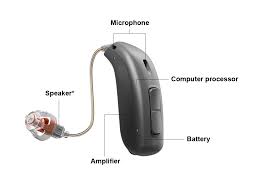How do Hearing Aids Work
How Hearing Aids Work Hearing aids have become incredibly small pieces of digital technology. Even these little devices can improve the quality of communication for many people with hearing loss. So, how do hearing aids work? Well, let's find out! While most hearing aids have the same basic components, some will have modifications based on the wearers' needs. Here is a basic overview of how the most common hearing aids work. Basic Hearing Aid Components As mentioned, all hearing aids have the same 4 basic components: microphones, an amplifier, a receiver, and a battery. Microphones - The microphones take in the sound and turn it into electrical signals Amplifier - The amplifier increases the strength of the signal to your prescription A Receiver or Speaker - The receiver or speaker takes that signal delivers a louder sound to your ears Battery - The battery, disposable or rechargeable, powers the whole process Sounds simple, right? But a lot happens in those 4 little parts in addition to some other components that can be involved. Other Components While these other components don't necessarily change the process for how the sound enters your ear, they can manipulate how you experience the sound. Domes or Custom molds - at the end of the receiver there is always a little rubber dome or a custom mold. Based on the size, shape, and style of the dome or mold, it will change how the sound enters your ear. Wax filters - another part of the receiver, most...


Recent Comments